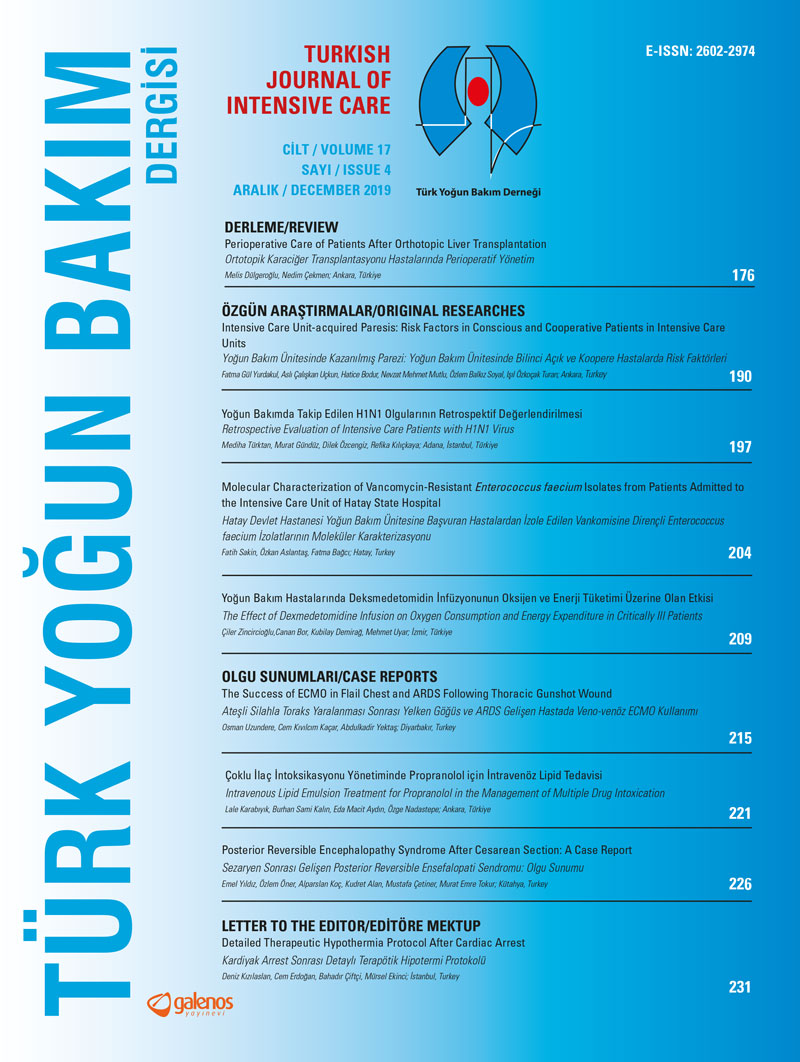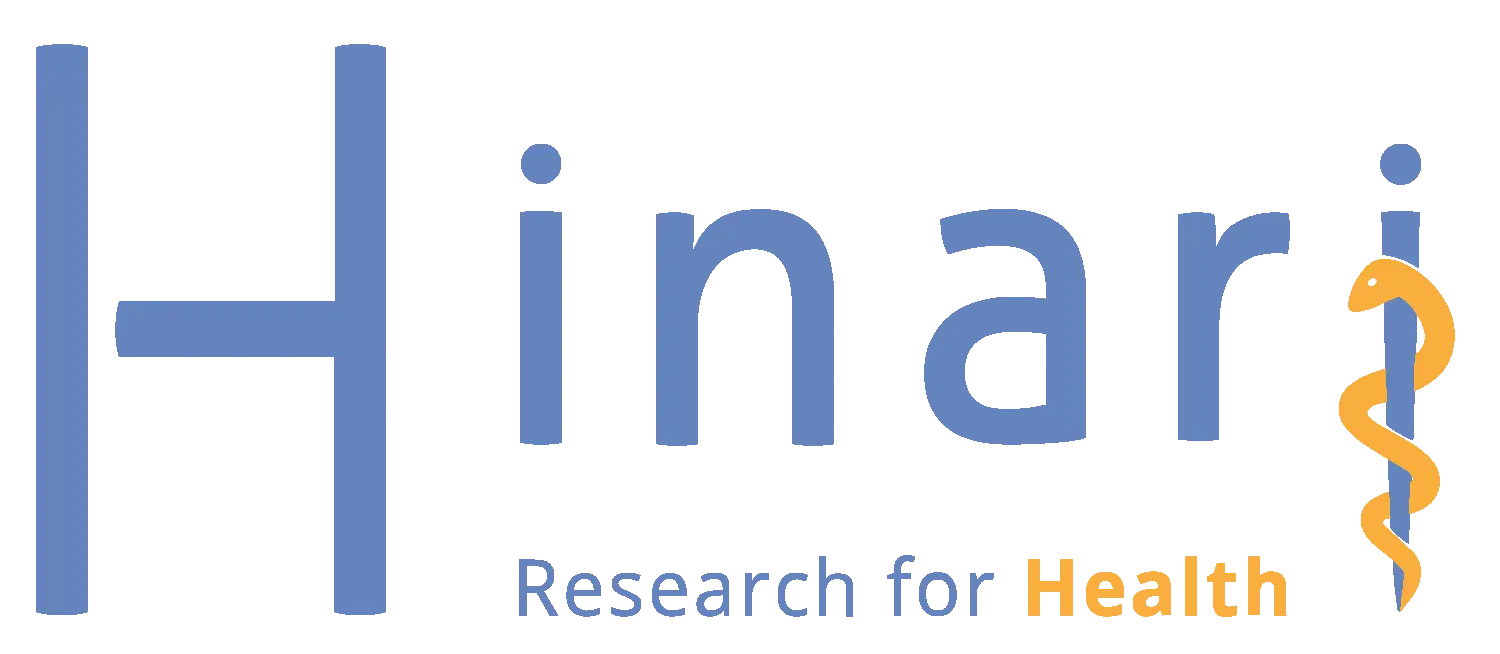Öz
Amaç:
Anksiyete, mekanik ventilasyon uygulanan yoğun bakım hastalarında oksijen tüketimi (VO2) ve enerji tüketimini (ET) artırarak olumsuz etkiler gösterebilir. Selektif alfa-2 agonist etkili sedatif olan deksmedetomidinin bu duruma etkileri daha önce çalışılmamıştır. Bu çalışmada mekanik ventilasyon uygulanan yoğun bakım hastalarında deksmedetomidinin oksijen ve ET üzerindeki etkileri indirekt kalorimetri ile araştırılmıştır
Gereç ve Yöntem:
Her hasta kendisinin kontrol grubu olarak planlandı. Deksmedetomidin infüzyonu öncesi tüm parametrelerin başlangıç değerleri kaydedildi. Daha sonra 1 μg/kg bolus ve 0,2-0,7 μg/kg/saat şeklinde deksmedetomidin infüzyonu başlandı. Sedasyon iki saat boyunca bispektral indeks (BİS) ile orta düzeyde sedasyon olacak şekilde ayarlandı. Çalışma boyunca BİS skorlarının 60-70 arasında tutulması hedeflendi. Deksmedetomidin infüzyonu uygulanan 2 saat boyunca VO2, karbondioksit üretimi (VCO2), ET değerleri indirekt kalorimetri yöntemiyle ölçüldü. Deksmedetomidin infüzyonu durdurulduktan sonraki 1., 2. ve 3. saatteki ölçümler tekrarlanarak çalışma sonlandırıldı.
Bulgular:
Çalışmaya 15 hasta katıldı. Ortalama yaş 48±16 yıl, ortalama APACHE 2 skoru 14,8±6,2 idi. Deksmedetomidin infüzyonu sırasında VO2, VCO2 ve ET başlangıç değerlerle karşılaştırıldığında anlamlı derecede azaldı (p<0,05). İlaç infüzyonu durdurulduktan sonra tüm değerler başlangıç değerlerine yaklaştı.
Sonuç:
Yoğun bakım hastalarında deksmedetomidin infüzyonunun metabolik stres cevabını etkileyebileceği ve sedasyonun kesilmesi ile birlikte oksijen ve ET’de artışların olabileceği sonucuna varıldı.
Anahtar Kelimeler: Yoğun bakım, sedasyon, deksmedetomidin, oksijen tüketimi, enerji tüketimi
Referanslar
- Weledji EP, Assob JC. The systemic response to surgical trauma-a review. East and Central African Journal of Surgery 2012;17:3-12.
- Desborough JP. The stress response to trauma and surgery. Br J Anaesth 2000;85:109-17.
- Van den Berghe G. The neuroendocrine response to stress is a dynamic process. Best Pract Res Clin Endocrinol Metab 2001;15:405-19.
- De Gaudio AR, Bonifazi M, Romagnoli S. The Stress Response of Critical Illness: Which Is the Role of Sedation?. In: De Gaudio AR, Romagnoli S, editors. Critical Care Sedation; Springe, Cham: 2018.p.9-19.
- Cooney RN, Frankenfield DC. Determining energy needs in critically ill patients: equations or indirect calorimeters. Current Opin Crit Care 2012;18:174-7.
- Kress JP, O’Connor MF, Pohlman AS, Olson D, Lavoie A, Toledano A, et al. Sedation of critically ill patients during mechanical ventilation. A comparison of propofol and midazolam. Am J Respir Crit Care Med 1996;153:1012-8.
- Vernon DD, Witte MK. Effect of neuromuscular blockade on oxygen consumption and energy expenditure in sedated, mechanically ventilated children. Crit Care Med 2000;28:1569-71.
- Terao Y, Miura K, Saito M, Sekino M, Fukusaki M, Sumikawa K. Quantitative analysis of the relationship between sedation and resting energy expenditure in postoperative patients. Crit Care Med 2003;31:830-3.
- Venn M, Newman J, Grounds M. A phase II study to evaluate the efficacy of dexmedetomidine for sedation in the medical intensive care unit. Itensive Care Med 2003;29:201-7.
- Keating GM. Dexmedetomidine: A Review of Its Use for Sedation in the İntensive Care Setting. Drugs. 2015;75:1119-30.
- Jakob SM, Ruokonen E, Grounds RM, Sarapohja T, Garratt C, Pocock SJ, ve ark. Dexmedetomidine vs midazolam or propofol for sedation during prolonged mechanical ventilation: Two randomized controlled trials. Jama 2012;307:1151-60.
- Riker RR, Shehabi Y, Bokesch PM, Ceraso D, Wisemandle W, Koura F, ve ark. Dexmedetomidine vs midazolam for sedation of critically ill patients: a randomized trial. Jama 2009;301:489-99.
- Pandharipande PP, Pun BT, Herr DL, Maze M, Girard TD, Miller RR, ve ark. Effect of sedation with dexmedetomidine vs lorazepam on acute brain dysfunction in mechanically ventilated patients: the MENDS randomized controlled trial. Jama 2007;298:2644-53.
- Avidan MS, Zhang L, Burnside BA, Finkel KJ, Searleman AC, Selvidge JA, ve ark. Anesthesia awareness and the bispectral index. N Engl J Med 2008;358:1097-108.
- Zhang Z, Chen K, Ni H, Zhang X, Fan H. Sedation of mechanically ventilated adults in intensive care unit: a network meta-analysis. Sci Rep 2017;7:44979.
- Cerra FB, Benitez MR, Blackburn GL, Irwin RS, Jeejeebhoy K, Katz DP, ve ark. Applied nutrition in ICU patients. A consensus statement of the American College of Chest Physicians. Chest 1997;111:769-78.
- Alberda C, Gramlich L, Jones N, Jeejeebhoy K, Day AG, Dhaliwal R, ve ark. The relationship between nutritional intake and clinical outcomes in critically ill patients: results of an international multicenter observational study. Intensive Care Med 2009;35:1728-37.
- Thibault R, Pichard C. Nutrition and clinical outcome in intensive care patients. Curr Opin Clin Nutr Metab Care 2010;13:177-83.
- Weijs PJ, Looijaard WG, Beishuizen A, Girbes AR, Oudemans-van Straaten HM. Early high protein intake is associated with low mortality and energy overfeeding with high mortality in non-septic mechanically ventilated critically ill patients. Crit Care 2014;18:701.
- Triltsch AE, Welte M, Von Homeyer P, Groe J, Genähr A, Moshirzadeh M, ve ark. Bispectral index-guided sedation with dexmedetomidine in intensive care: a prospective, randomized, double blind, placebo-controlled phase II study. Crit Care Med 2002;30:1007-14.
- Constantin JM, Momon A, Mantz J, Payen JF, De Jonghe B, Perbet S, et al. Efficacy and safety of sedation with dexmedetomidine in critical care patients: a meta-analysis of randomized controlled trials. Anaesth Crit Care Pain Med 2016;35:7-15.
- Boyd O, Grounds M, Bennett D. The dependency of oxygen consumption on oxygen delivery in critically III postoperative patients is mimicked by variations in sedation. Chest 1992;101:1619-24.
- Bruder N, Raynal M, Pellissier D, Courtinat C, Francois G. Influence of body temperature, with or without sedation, on energy expenditure in severe head-injured patients. Crit Care Med 1998;26:568-72.
Telif hakkı ve lisans
Telif hakkı © 2019 Yazar(lar). Açık erişimli bu makale, orijinal çalışmaya uygun şekilde atıfta bulunulması koşuluyla, herhangi bir ortamda veya formatta sınırsız kullanım, dağıtım ve çoğaltmaya izin veren Creative Commons Attribution License (CC BY) altında dağıtılmıştır.






















